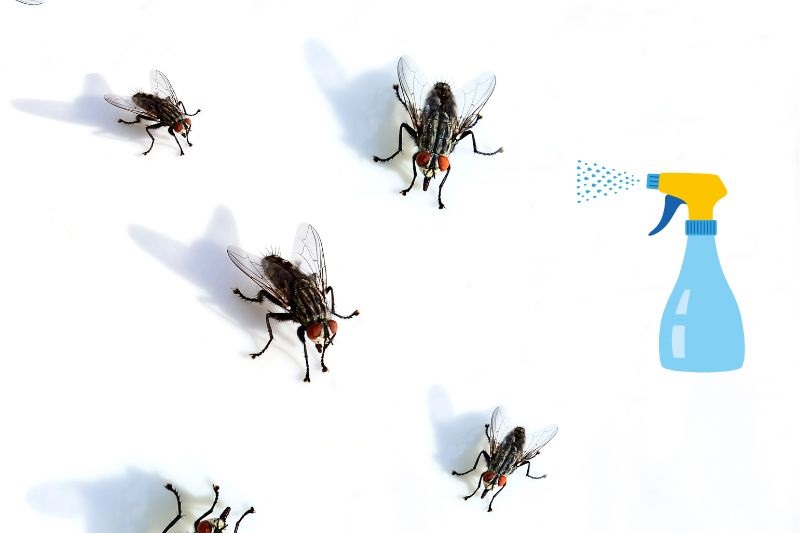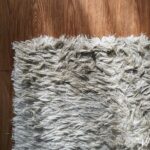Summertime is the time for lounging in the sun, sipping sangria and swatting flies. Wait. What was that? There’s got to be an easier way to keep flies in check!
Well, there is. The answer: Make a natural fly deterrent spray and squirt the flying insects with it.
It’s not hard to concoct a homemade fly repellent. You just need a few minutes, a handful of ingredients and a spray bottle, and then you’ll be ready to spritz your winged enemies out of your home! Check out the options below.
Homemade Fly Deterrent Recipes
Depending on the scale of your problem, you may find some of the options work better than others.
In addition, while spraying a natural fly deterrent is one way of controlling your fly problem, you should consider using other fly management methods alongside it.
By utilising multiple fly repellents, you can get a handle on the situation and keep unwanted guests away. You can learn more about these additional measures in the section below.
Note: Before spraying the solutions below around your home, test them on discreet patches of fabric to see if there are any bad reactions. Some products listed below may stain or discolour a surface. You try the methods below at your own risk.
Option 1: Apple cider vinegar
Mix one tablespoon of apple cider vinegar, a tablespoon of witch hazel, a cup of water and a few drops of essential oil in a spray bottle.
Spray the solution in fly-heavy zones. The intense, sharp citrus smell of witch hazel combined with a repelling essential oil will keep the flies at bay.
Option 2: Vodka
Mix half a cup of vodka, a few drops of essential oil and a cup of water in a spray bottle and spray a fine mist over problematic areas.
Option 3: Cayenne pepper
Combine a teaspoon of cayenne pepper and a cup of water in a spray bottle. Then, spray the spicy solution around the home to repel flies. Flies don’t like spicy cuisine and aromas.
Note: You don’t spray any of the solutions on this list directly at someone or an animal! You could seriously hurt them if you did this.
Option 4: Washing up liquid
Mix a tablespoon of washing up liquid with two cups of water, a teaspoon of bicarbonate of soda and a teaspoon of white vinegar in a spray bottle. Then, squirt your pesky flies with the ingredients.
Option 5: Isopropyl alcohol
Add half a cup of water, half a cup of isopropyl alcohol and a teaspoon of washing up liquid to a spray bottle. Then, spray the solution directly onto the flies that are annoying you. The flies should drop from the air immediately.
Option 6: Citronella oil
Create a fly-repelling solution by mixing one tablespoon of white vinegar, one cup of water, multiple drops of citronella oil (you burn citronella-scented candles to keep flies away outdoors), and a few blobs of washing up liquid in a spray bottle. Then spray the solution around to repel the winged creatures!
Note: While essential oils can keep pesky flies at bay, they can sometimes trigger allergic reactions and cause problems for pets. For example, lemongrass is toxic to dogs. Try to use essential oils that are pet-friendly.
Other Ways to Keep Flies Away
Spraying flies is one way of stopping them from flying rampant around your home. However, the spraying method works well when it is paired with other fly management tools.
Take note of the following and use them alongside your spray:
1. Make your home as undesirable to flies as possible
Flies are feasting on the waste you leave inside and outside your home. So don’t give them access to this source of nourishment, and they’ll leave you alone. You should:
- Clean plates immediately.
- Don’t leave food on countertops.
- Cover food if it’s left out.
- Get rid of rotten food.
- Mop up liquids.
- Clean the rubbish bin and food caddy frequently.
By doing all of the above, you won’t be giving the flies what they want. So they won’t want to visit you!
2. Set traps and start swatting
Setting traps to capture flies is one of the easiest ways to manage the situation. Plus, the traps work continuously, even when you’re not at home!
There are many versions of traps to choose from, including UV, sticky and DIY ones. All you need to do is invest a little time researching what trap is best for your home.
For example, you could create a homemade fly trap using apple cider vinegar, water, washing up liquid and cling film.
Pour a tablespoon of apple cider vinegar into a glass, add a cup of water, and follow it up with a few blobs of washing up liquid.
Seal the top of the glass with some cling film. Then, poke a few small holes in it.
Over time, the flies are attracted to the liquid in the glass, so they go through the tiny holes to investigate. However, they can’t get back out of the holes, so they end up trapped in the glass.
Sticky strips, on the other hand, can be hung in troublesome areas. The strips have a very gluey surface that traps the flies when they land on them. Once the adhesive strips are in place, they require very little input from you!
A fly swatter, in contrast, is a handheld tool that you swing at flies. The goal is to hit the fly and crush it between the flexible vented material at the top of the swatter and a hard surface.
Using a swatter is not tricky, but you must get your swing time right. The only significant drawback is that you need to be at home to try out this technique.
3. Use candles and diffusers
As a backup to your spray, you could have scented candles and diffusers around your home that give off scents that repel flies.
The pungent aroma created by the candles, diffusers and spray will not appeal to the flies, so they won’t pester you.
4. Close or cover windows and doors
Limiting access is another way of controlling flies. So, ensure you shut the doors and windows in your house. The flies won’t come in if there is no way to enter.
If you want to leave doors and windows open, pop a net or screen up to stop flies and other bugs from coming into your home.
As an extra precaution, spray the natural fly deterrent around the area to ensure the flies stay away.
5. Grow plants and herbs that flies don’t like
As mentioned, flies are scent-sensitive, so why not grow plants that repel them in your garden or on your windowsills?
Plants like mint, basil, lavender, rosemary, and marigolds are major deterrents for flies.
Couple these odour-filled plants with your deterrent spray, and the flies won’t want to visit you.
6. Call a professional
If you can’t manage the fly-related situation, it’s time to call a professional. A pest control expert will come out to assess what’s happening and suggest why you have the recurring problem and how to deal with it.
Although it can be expensive to call a professional out, it’s sometimes the best course of action, especially if you’ve already spent a lot of money trying to solve the problem yourself.
Having a fresh and experienced pair of eyes to look at the situation can do the world of good.
For more tips see our in-depth guide on how to keep flies away.
What Smells Do Flies Hate the Most?
Flies hate the following smells eucalyptus, lemongrass, peppermint, lavender and citronella. Buy these scents in essential oil form and use them in the sprays listed above.
Although most of these aromas are pleasing, calming and relaxing to humans, flies detest them. If you spray these odours around your home, you’ll not only keep the flies away, but you’ll also end up with a well-scented home!
What’s the Fastest Way to Get Rid of Flies Outside?
You can spray one of the natural fly-repelling solutions above outside to keep flies at bay.
However, you should also consider using citronella candles. They’re a cheap, easy, and effective solution to the problem.
In addition, you should figure out why the flies are coming to your home. Clean up any waste food, liquid and stagnant water, and cover up the food you’ve got on display. This should make the garden less inviting to the flies.
Finally, plant some not-fly-friendly plants in your garden – for example, marigolds and lavender. OR hang some UV lighting up to attract the flies and zap them! This will put an end to your issue fairly quickly.

Bethan has a passion for exploring, reading, cooking and gardening! When she’s not creating culinary delights for her family, she’s concocting potions to keep her house clean!






